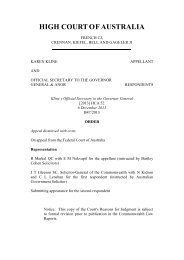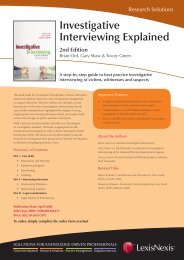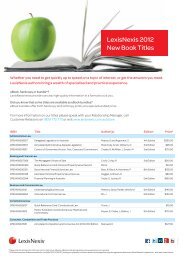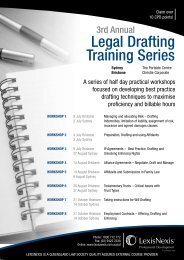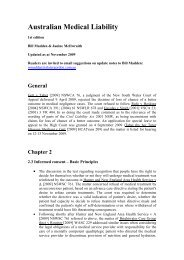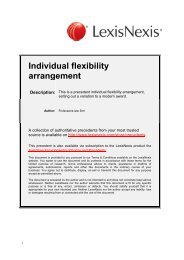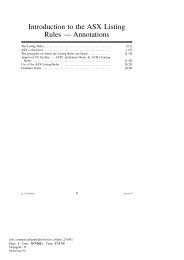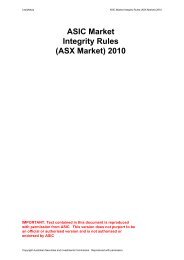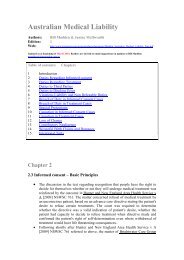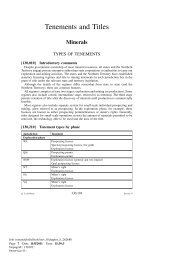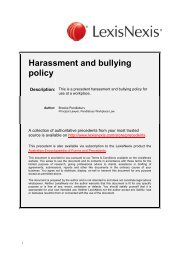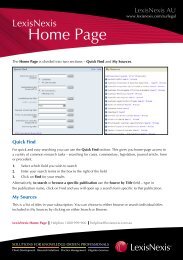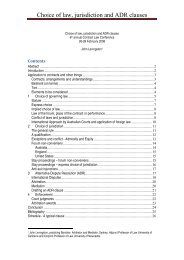Torts: Cases and Commentary - LexisNexis
Torts: Cases and Commentary - LexisNexis
Torts: Cases and Commentary - LexisNexis
You also want an ePaper? Increase the reach of your titles
YUMPU automatically turns print PDFs into web optimized ePapers that Google loves.
5.19 Ethical framework<br />
<br />
<br />
<br />
<br />
<br />
For an interesting discussion on the possible clinical benefit to the patient of<br />
an early disclosure of an adverse event, see A Allan & D McKillop, The health<br />
implications of apologizing after an adverse event, International Journal for<br />
Quality in Health Care 5 February 2010.<br />
Incidental to the discussion regarding duty to disclose error are recent moves<br />
towards a statutory framework for ‘m<strong>and</strong>atory reporting’. For example,<br />
Section 71A of the Medical Practice Act 1992 (NSW) introduced a concept of<br />
“reportable misconduct”, placing an obligation on doctors (after 1 October<br />
2008) to report certain types of misconduct to the New South Wales Medical<br />
Board.<br />
o<br />
71A Reportable misconduct: (1) A registered medical practitioner<br />
commits reportable misconduct in the following circumstances: (a) if<br />
he or she practises medicine while intoxicated by drugs (whether<br />
lawfully or unlawfully administered) or alcohol, (b) if he or she<br />
practises medicine in a manner that constitutes a flagrant departure<br />
from accepted st<strong>and</strong>ards of professional practice or competence <strong>and</strong><br />
risks harm to some other person, (c) if he or she engages in sexual<br />
misconduct in connection with the practice of medicine. (2) A<br />
registered medical practitioner who believes, or ought reasonably to<br />
believe, that some other registered medical practitioner has<br />
committed reportable misconduct must, as soon as practicable, report<br />
the conduct to the Board.<br />
Guidelines issued in August 2008 by the New South Wales Medical Board<br />
provide some commentary on subsection (b), indicating that the Board<br />
considers a flagrant departure from accepted st<strong>and</strong>ards involves a very high<br />
degree of departure from such st<strong>and</strong>ards. Conduct which is merely careless<br />
or negligent (in the sense that it fails to meet the st<strong>and</strong>ards of care owed to<br />
patients) will generally not be flagrant. Whilst it is possible for reasonable<br />
practitioners to disagree about whether a particular practice is or is not<br />
negligent, a flagrant departure is likely to be one which is both serious <strong>and</strong><br />
obvious to any reasonable practitioner. This is particularly likely to be the<br />
case where another practitioner engages in reckless, unethical, wilful or<br />
criminal behaviour. The reportable misconduct must pose a risk of harm to<br />
some other person as well as constituting a flagrant departure from accepted<br />
st<strong>and</strong>ards of professional practice or competence, before m<strong>and</strong>atory<br />
reporting is required.<br />
The Guideline can be found on the New South Wales Medical Board website<br />
http://www.nswmb.org.au under the menu item ‘news & updates’.<br />
Similar ethical obligations are reflected in 6.3.4 <strong>and</strong> 6.3.5 of Good Medical<br />
Practice: A Code of Conduct for Doctors in Australia which will be adopted by<br />
the new Medical Board of Australia http://goodmedicalpractice.org.au/code/<br />
7



